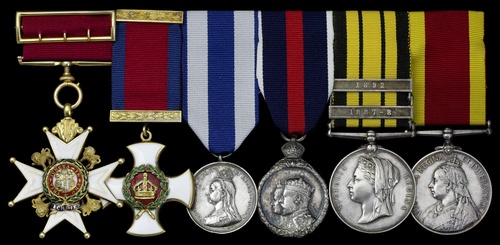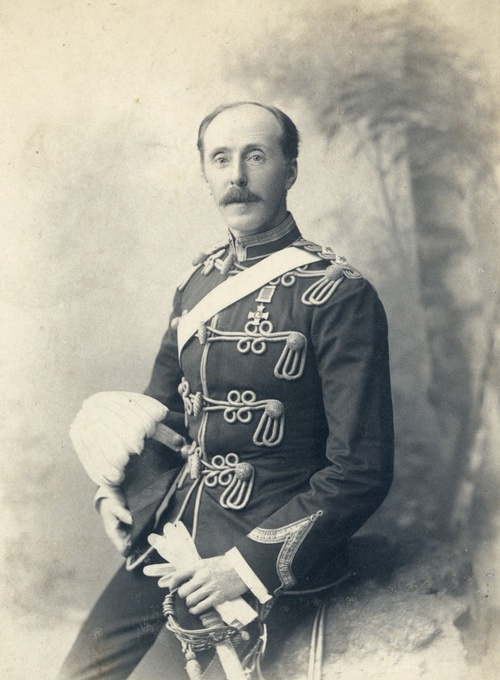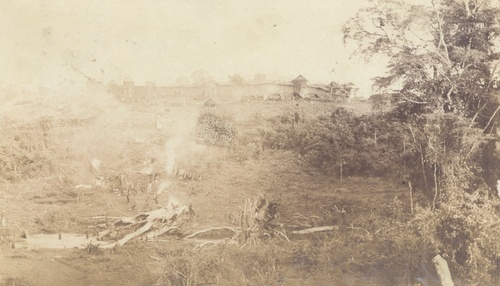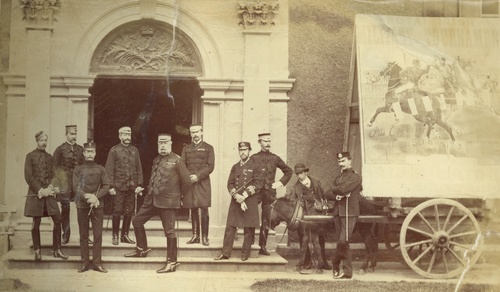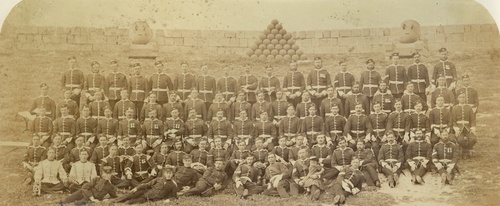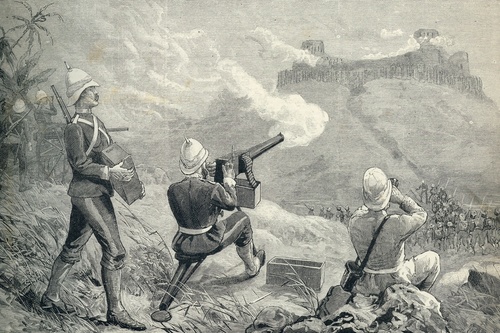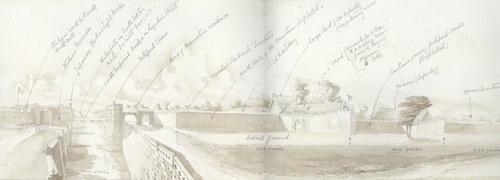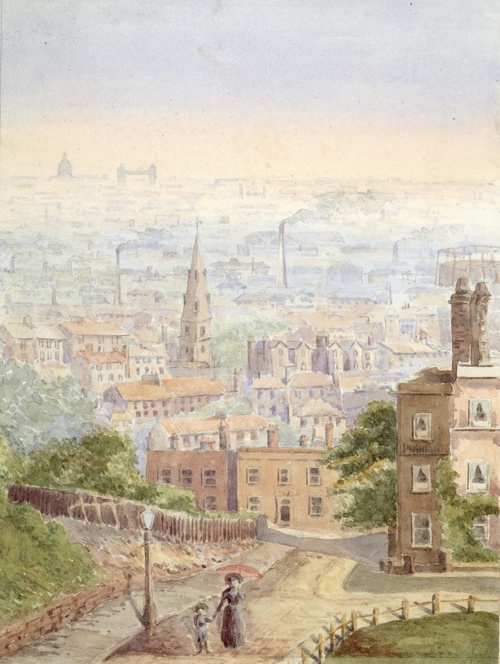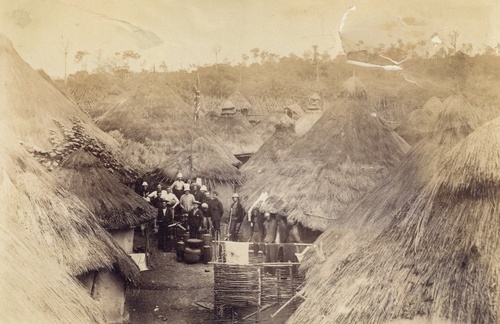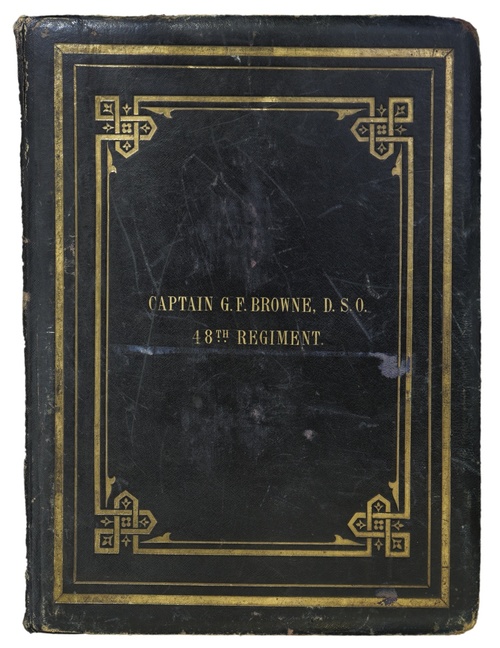Auction: 19001 - Orders, Decorations and Medals
Lot: 539
Sold by Order of a Direct Descendant
The superb gold C.B., West Africa operations D.S.O. group of six awarded to Major-General G. F. Browne, Northamptonshire Regiment, who served in the 1887-88 expedition against the Yonnies and was wounded in the costly attack on Tambi in 1892; he later acted as Military Attaché at Pekin from 1896-1903
The Most Honourable Order of the Bath, C.B. (Military) Companion's breast Badge, gold (18 carat) and enamel, hallmarks for London, complete with gold straight suspension and riband buckle; Distinguished Service Order, V.R., gold and enamel, with integral top riband bar; Jubilee 1897, silver; Coronation 1902, silver; East and West Africa 1887-1900, 2 clasps, 1887-8, 1892 (Captn. G. F. Browne. North'n R.); China 1900, no clasp (Bt Col: G F. Browne. D.S.O, Staff. C.F.F.), mounted in this order on the Spink & Son bar as originally worn, good very fine (6)
C.B. London Gazette 30 June 1905.
D.S.O. London Gazette 3 August 1888:
'For Special Service to the West Coast of Africa, serving in the expedition against the Yonnies, 1887-88.'
George Fitzherbert Browne was born on 29 January 1851 at Newry, County Down, and educated at the Royal Military College, Sandhurst. He entered the 48th Regiment as Ensign without purchase on 6 July 1870, was promoted Lieutenant, 28 October 1871 and Captain, 16 December 1882. Following service in Malta, the East Indies and South Africa, he was seconded for service on the Staff in April 1884, appointed Deputy Assistant Adjutant and Quarter Master General for the Dublin District, and later D.A.A.G. at Headquarters, Ireland, from 1885-1889.
It was in this period that Browne was seconded for Special Service to the West Coast of Africa where he served under Brevet-Colonel Sir Francis Walter de Winton, Royal Artillery, in the expedition against the Temne tribesman from Yoni, approximately 50 miles inland from Freetown. For a little over two years they had been prevented by rivals from the Kpaa and Mende tribes from accessing certain tide-water trading centres on the Rokel, Ribi and Bumpe Rivers. Highly aggrieved, they had attacked the Kpaas and Mendes in 1886. A truce was brokered by the British Governor but the Mende had broken it, 'in revenge for former raids'. The Yoni subsequently waited for the dry season, and in October they destroyed Mende villages along the Bumpe River which was in a British potected area. In response, the Colonial authorities delivered a stern warming to cease attacks, but the Yoni ramped up their campaign and attacked several towns ruled by Mammy Yoko, a British ally. Several Creoles - who were British subjects - were killed and a Police Constable was wounded. After cutting off an ear, hand and the thumb from a captive, the Yoni sent him to the British Governor with a message that the Yoni were coming and that nobody would be spared, especially the whites who would be mutilated in this fashion (A contemporary newspaper, refers).
Time to teach the Yoni 'a sharp and severe lesson'
With the blessing of Parliament, de Winton assembled a considerable force with which to take on the Yoni tribesmen. This included 298 troops from the 1st Battalion, West India Regiment, 45 men from the Sierra Leone Police Force, 38 naval personnel from Her Majesty's Ships Acorn, Icarus and Rifleman, 400 irregulars from friendly tribes, 500 local carriers, 200 local 'bush cutters', and 19 Government officials and military officers, including Browne. Moving up the Ribi River by boat to Mafengbe, De Winton's force then advanced through dense bush, facing ambush along the way. The column increased as 'friendlies' tagged on, much to the disgust of de Winton:
'They cling to the rear of the column and their only object is plunder and the capture of slaves.'
The bush acted as ideal cover for the Yoni warriors, who attempted to intimidate British forces and slow down their progress. A contemporay newspaper account from Browne's archive sets the scene:
'Around us, though we could not see them, were fifteen hundred Yonnies yelling war songs, blowing horns, beating drums, and keeping up a continual fusillade on the head of the column. It certainly was exciting. We advanced slowly, bridging streams, wading through swamps, and firing volleys whenever we heard loud voices or the sound of hatchets, for they were cutting down trees to lay across our path during the whole of the march.'
On 21 November, the Yoni sprang a significant ambush and nearly five hours of continuous fighting commenced before their Capital of Robarrie was reached. Manning the 7-pounder field gun and Maxim machine gun, the bluejackets began to turn the tide of battle. Aided by the West Indians armed with Martini-Henry rifles and tube-firing rockets, the Yoni were swept away by superiority of weaponry; their old muzzle-loaders and tribal weaponry were no match:
'A few tremendous volleys from the Maxim gun cleared the wooden towers of the enemy, who were soon in flight, and the fort was entered without further bloodshed. Many of the enemy were killed, a fate richly deserved, as they have a habit of killing Her Majesty's subjects when old and useless, and taking the boys and girls for slaves.'
The Yoni warriors fled, stampeding out of town, hotly followed by the 'friendlies', who now totally out of control, looted and burned the smaller villages in the area.
Leaving a small garrison of West Indians, the column marched on Macondoo where 14 Yoni warriors were killed, followed by Rometto where they caught the Yonnies unprepared. Large quantities of arms were captured together with leading Yoni Chiefs, notably the brother of Bey Sherbro of Yonnie, son of Bey Simmerah and Bey Cobolo of Marampa. By early December the remaining Yoni elders had had enough and submitted to the British Governor, who declared Yoni territory was:
'now to be considered the Queen's by conquest.'
The column returned to Freetown having suffered 20 casualties, all wounded, and the men embarked for home about Rifleman. In respect of this work, Sir Francis de Winton was created C.B., and Browne was awarded a well-deserved D.S.O.
Back to tackle Chief Carimoo
In 1892, Browne was once again called into action after Baron Henry de Worms, the Under Secretary for the Colonies, faced an interrogation in the House of Commons over the great loss of life and destruction to property on the British side of the Scarcies, by the 'robber Chief Carimoo'. The previous May, Major Moore, Inspector General of the Sierra Leone Frontier Police, had been sent up into the Limbah country with a detachment of police endeavouring to effect an arrangement with Carimoo. The peaceful mission went disastrously wrong - one policeman was killed and two were wounded. Moore retreated and the wet season arrived to halt proceedings, but in the Commons it was strongly felt that steps should be taken to punish the offenders, especially the 'troublesome' Chief. Browne and Moore prepared a scheme of operations to put this into effect, but Carimoo, anticipating a backlash, stockaded and fortified his home town of Tambi and waited. A contemporary newspaper takes up the story:
'It is reported that Major Moore attacked his town on Monday, the 14th. The fight lasted from 11 a.m. until half-past 2 p.m. Captain Robinson, R.A., who had volunteered to accompany the expedition, was shot dead, and also one Private; all the other officers in charge of the expedition were wounded, some seriously, also Privates. Captain Jones is the only officer who came out of the fight without a scratch. This reverse was to be expected. It is impossible for a force of 150 men, only partially trained, to fight over 1,000 men on their home ground.'
The attack of 14 March 1892 was a harsh lesson that facing overwhelming odds, and despite the experience of Browne, the limited manpower of the frontier police force could not chastise Carimoo. What was needed was the West India Regiment who had remained at Freetown:
'It is a well-known fact that the natives do not fear the police, but have a wholesome respect for the red coats.'
A second expedition consisting of 18 officers and 550 red coats, together with a body of the Frontier Police, proved more fruitful a short time later - after some sharp fighting, Carimoo's forces were routed and their leader forced to take refuge at Coffew within the French sphere of influence.
Browne returned to Teignmouth, England to recover from his wounds and then served in the Straits Settlements from 2 May 1889-17 Devember 1890. On 19 September 1896, he was appointed Military Attaché at Pekin and promoted Lieutenant-Colonel. Despite residing at the Legation in Pekin, he had been lucky to escape the City and thus was not present during the Defence of Legations in 1900.
In his role at Pekin, Browne witnessed the increasing efforts of China, Japan, Russia and Germany to increase their military and political influence in the Far East, and advised the British Government accordingly. In 1900, he discounted the idea of a Russo-Japanese War, but warned that:
'An unforeseen circumstance might at any moment precipitate affairs.' (The China Question: Great Power, Rivalry and British Isolation, 1894-1905, refers.)
The Boxer crisis had the potential to escalate into a regional war, but in this case, Browne had got it wrong; the Russo-Japanese War of 1904-05 displayed the dangers of rival imperial ambitions.
Returning to Britain in 1903, Browne was appointed Assistant Adjutant General at Headquarters and gave a lecture on Manchuria to the Aldershot Military Society. Created C.B. in 1905, he was promoted to Major-General the following year. At around this time, Browne began to argue that Britain should act more graciously towards the Chinese, especially regarding the possible return of Wei Hai Wei. In a letter penned to the Australian journalist and The Times Peking correspondent, George Ernest 'Chinese' Morrison, he was keen to direct Chinese favour away from German influence and towards Britain instead:
'I think as retaliation for the last German coup we ought to raise the question generally of Europeans giving up fleeced territory of China proper. I expect the French would agree, and then if Kaiser Bill proved recalcitrant we and the French would go and leave a rankling sore between China and Germany, which might eventually lead to war, if Chinese military reforms grow apace.'
His thinking was not without merit. Wei Hai Wei needed significant financial investment in the docks and fortifications, and locking up vast numbers of men for its defence would have little or no material effect on operations in India and the Near East. Equally, Browne was also keen to stress the Kaiser's army:
'The German army is the most formidable military machine the world has ever seen. In a few days millions of armed and trained men can quietly take their places in the ranks and can be moved with unerring certainty on a neighbouring state like a living irresistible machine.'
His fears regarding the speed of potential enemy mobilisation are perhaps best indicated in a report from the Singleton Argus of New South Wales, where he laid bare the £75,000,000 cost of the Siberian railway:
'Colonel Browne says the railway will be invaluable to Russia for military purposes, though trains with troops would take twenty days on the journey from Europe.'
On 20 May 1910 he assisted with the Internment of King Edward VII at the Royal Chapel of St. George, Windsor, and took responsibility for the Chinese Royal Guests and Representatives, including His Imperial Highness Prince Tsai-Tao, Special Ambassador representing His Majesty The Emperor of China. In the twilight of his career, Browne was appointed Colonel Commanding, Northamptonshire Regiment on 12 December 1910. Retired on 15 February 1913, he assisted with the gerneral management of the Kent County Regiments during the Great War and died on 7 August 1935 at Malwa, Mayfield Road, Inverness.
To be sold with an outstanding archive housed in a leather album with gilt-tooled inscription to front cover, 'Captain G. F. Browne, D.S.O. 48th. Regiment.' Approximately 420mm x 320mm, containing the following:
(i)
Original Certificate from the Royal Military College, stating 'Gentlemen Cadet George F. Browne as having been found duly qualified to hold a Commission in Her Majesty's Service' based upon examination held between 3-9 June 1870; Commission Certificate appointing Browne Ensign to the Infantry, dated 29 June 1870; Certificates for appointment to Lieutenant and Captain.
(ii)
First Class Certificate of Musketry, Hythe, 3 December 1873; Army Signalling Certificate No. 48, to Lieut. G. F. Browne, 12 February 1878.
(iii)
Reports upon the Examination of Lieut. G. F. Browne, 48th Regiment, for High Proficiency in Hindustani, 2 September 1878 & 2 December 1878; Army Form B. 194 noting service career 1870-1890, and ability in French and Turkish - 'Passed' 2 November 1886.
(iv)
Forwarding letter for the China Medal, dated 11 September 1902; Forwarding letter for Coronation Medal from Buckingham Palace, dated 8 October 1902; 1911 Coronation Certificate to Major-General G.F. Browne, C.B., D.S.O.
(v)
A letter from the Chinese Legation, Portland Place, W.1., thanking Browne for his services and courtesy associated with assisting H.I.H. Prince Tsai-tao during the funeral of King Edward VII; a signed portrait photograph of the Prince, taken at Pekin.
(vi)
Invitations for the Ceremony of Re-Inauguration in the Chapel of King Henry VII, Westminster Abbey, 22 July 1913, to Major-General G. F. Browne and Mrs G. F. Browne (2).
(vii)
An extensive archive of contemporary newspaper cuttings relating to his Expeditions to Africa and subsequent career, affixed within album, together with sketches and watercolours produced by Browne showing considerable artistic flair. These depict various people and places associated with his career, notably African tribesmen and the landscapes of the Middle East and Far East; an interesting newspaper report and photograph regarding the collision of the Empress of Japan with a barque in 1900 - Browne is listed as saloon passenger aboard ship.
(viii)
Two letters written by Browne, accepting the role of Deputy Assistant Adjutant and Quartermaster General in the Dublin District, and the role of Military Attaché to Pekin; further letters from the War Office offering various appointments to Browne, including the position of Military Secretary for Education, dated 20 March 1903.
(ix)
Further letters handwritten to Browne by a host of important political and military leaders, including Field Marshal French and General Sir Redvers Buller; formal photographs at dinner in various stages of his career; copied photographs of the family home at Inverness and Browne with his grandaughter.
(x)
Certificate appointing Browne Major in the 4th Battalion, Kent Volunteer Regiment, dated 11 September 1916; letter of thanks from Kent County Constabulary expressing regreat as to his leaving service on the Isle of Thanet, dated 31 October 1916.
Subject to 20% VAT on Buyer’s Premium. For more information please view Terms and Conditions for Buyers.
Sold for
£9,000

